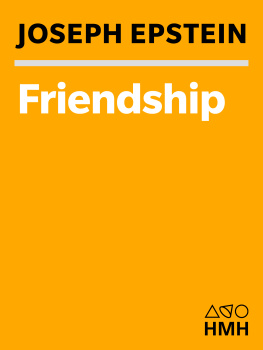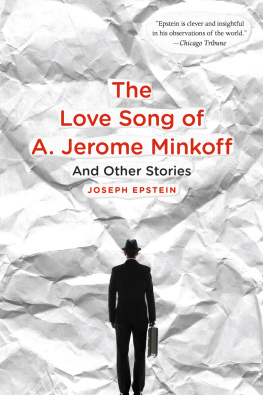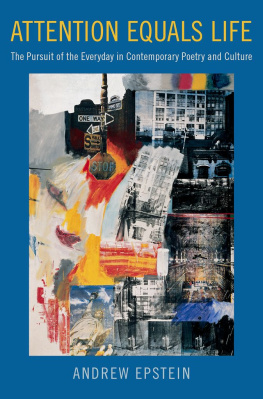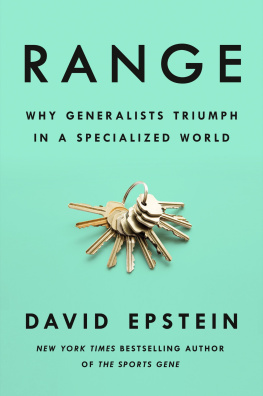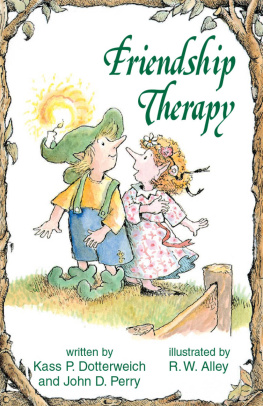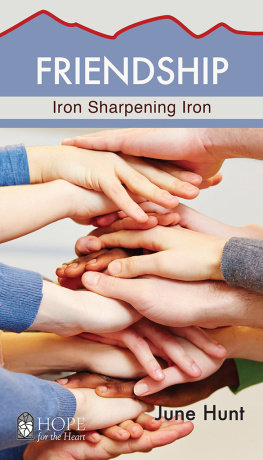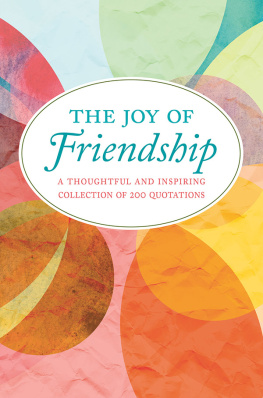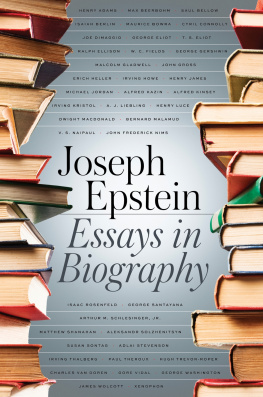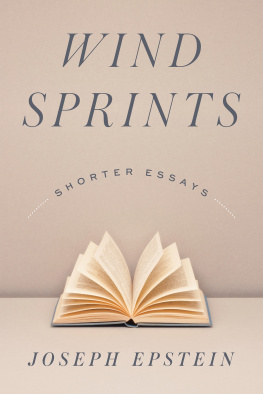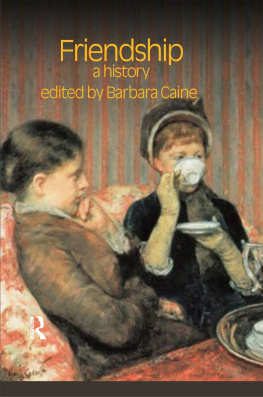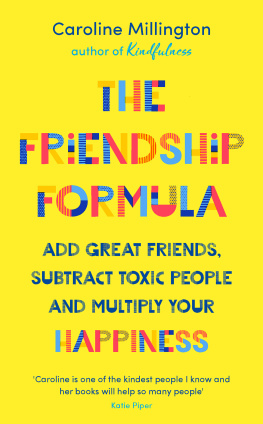Copyright 2006 by Joseph Epstein
All rights reserved
For information about permission to reproduce selections from this book, write to or to Permissions, Houghton Mifflin Harcourt Publishing Company, 3 Park Avenue, 19th Floor, New York, New York 10016.
www.hmhco.com
The Library of Congress has cataloged the print edition as follows:
Epstein, Joseph, date.
Friendship : an expos / Joseph Epstein.
p. cm.
Includes bibliographical references and index.
ISBN -13: 978-0-618-34149-8
ISBN -10: 0-618-34149-8
1. Epstein, Joseph, date.Friends and associates. 2. Friendship. 3. Friendship in literature. I. Title.
HM 1161. E 67 2006
302.3'4dc22 2005020059
e ISBN 978-0-547-52711-6
v3.1117
To Arnie Glass
A smart and good guyand a friend
The only rose without a thorn is friendship.
FORTUNE COOKIE
Not a few things about friendship are matters of debate.
ARISTOTLE, Nichomachean Ethics
Foreword
This is a book about friendship, its pleasures, complications, and manifold contradictions. The idea for writing the book was given to me, appropriately enough, by a friend, a sociologist and former bookseller in Evanston named Arnie Glass. You ought to write a book about friendship, Arnie said to me one afternoon over coffee. Its a subject about which no one has told anything like the full story.
What, I wondered, might the full story be? I had sensed my own friendships becoming more complex the older I had grown. Friendship had long since ceased to be the free-and-easy matter it once seemed. While I had many friends whom I considered dear to me, friendship itself was rarely any longer quite the simple, pleasurable thing it was when I was a boy and young man; nor was it any more at the center of my life. Why? What, if anything, had replaced it? What, exactly, was going on? What was the full story?
A book on a grand general subject like friendship can gain from having an argument or overriding point to make. When I began writing this book I had no such argument to make. But that seemed to me all right. Why write a book whose argument and conclusion one knew in advance? Still, it took a long time for my argumentthesis, case, call it what you willto emerge. During this period, I often felt like the composer William Walton, who, having been commissioned to write a Theme and Variations, remarked to a friend that he had written all the variations but hadnt yet found the theme.
The first thing I noted, with much relief, is that there is no great book on friendshipno single work that I would have to accommodate or with which I would have to argue. The best thing on the subject was written more than 2,300 years ago, in the twenty-five or so pages devoted to friendship in Aristotles Nichomachean Ethics. Ciceros De Amicitia, composed three hundred years later, fills in and fleshes out Aristotle in useful ways. And Montaignes sixteenth-century essay On Friendship records a great friendshiphis own with a slightly older contemporaryin an impressive if oddly incomplete manner, along the way remarking on the general nature of friendship.
More recently, lots of therapy-minded books on friendship have appeared, freighted with psychobabble (much soft talk about caring and sharing and nurturing and being there for you and the rest of it), usually written by people whose last names seem to end in the letters Ph.D. These books are about how to make more and better friends, how to get over broken friendships, some offering to tell one why men and women are indeed from the same planet or that friendship brings with it a power to shape our lives. Invariably, these manuals are filled with anecdotes and case studies that reek of low invention and high artificiality. Skimming these books, I realized that the last thing I wanted to write was another how-to book. I dont, after all, know how to master the art of friendship, and I have very little advice to give anyone, on this subject or any other. As it would turn out, what I wrote may be something closer to a how-not-to book.
Nor, I was to discover, is there a theory of friendship. Plato, in Lysis, his dialogue on friendship, throws up his hands even at defining what a friend is, ending the dialogue by having Socrates say: For our hearers will carry away the report that though we conceive ourselves to be friends with each other... we have not as yet been able to discover what we mean by a friend. Once one allows that friendships exist outside biological ties, everyone is left to define friendship on his or her own.
Perhaps the closest thing to a theory of friendship comes from Sigmund Freud. But Freudian doctrines, if truly believed, would just about eliminate friendship altogether. Eroticizing everything, as is their wont, Freudians find that much close male friendship is at its core homoerotic, while the notion of male-female friends outside sexual interest is generally inconceivable to Freudians, who not so secretly believe that all men wish to do with women is jump their bones.
One of the things I concluded during the writing of my book is that where there is sex, there is not friendship; something else is involvedperhaps many other thingsbut not friendship. Later in this book I take up the matter of friendship within marriage, and husbands and wives obviously make love. But I would contend that real friendship between husbands and wives sets in after courtship is done, when responsibility (for children and other things) deepens feeling, and appreciation extends well beyond romantic interest.
If I believed in Freud, I could not have written a book on friendship, because friendship doesnt quite exist for Freudians; sexual appetite, evident or obscured, washes it away. Fortunately I do not believe in Freud. In fact, I have come to believe instead that Freudian psychoanalysts, like Germany after World War II, ought to be made to pay reparations to their poor patient-victims.
Without a theory, then, and without any great books about friendship to argue with or revise, what was there to be said about the subject? I could always say that friendship is a damn fine thing, that friends are, you know, very special, but I fear that Hallmark beat me to that particular punch. I didnt wish to go the other way, to say that friendship is a nightmare of obligation and boredom, because, though obligation and boredom can sometimes be a part of friendship, I took too much pleasure from too many friends to believe that. But I did feel that something had changed in the nature of my feelings about friendship and in my relations with many of my friendsand I suspected that I was not alone in these feelings.
I decided to write a book on friendship based in good part on my own experience. The danger here, of course, is that of solipsism, which means, literally, only-oneselfism, or the belief that oneself is the only existent, and therefore significant, being in the world. When the solipsist gets a cold, he feels the World Health Organization should be notified; when the solipsist cant find a Kleenex, he blames it on capitalist methods of distribution. But the better solipsistic writers, from Rousseau and Ben Franklin on up to our day, have believed, as I believe, that their uniqueness is only a more intense and public version of your, our readers, uniqueness. When I write about my friendships in this bookmany sweet and strong, some burdensome and troublingI trust that they will also say something about your own friendships.
At times during the writing of this book I felt as if I were writing, along with a general inquiry into a very complex subject, something approaching my autobiography. My friends will recognize themselves in these pages (though they are for the most part not mentioned by name), some to their pleasure, some to their chagrin, and a few to their strong distaste. I hope that, after many of them have read it, I am left with a sufficient number of friends, as the English say, to see me out. I dont claim this is a courageous book, but it is, I fear, rather a reckless one.
Next page
